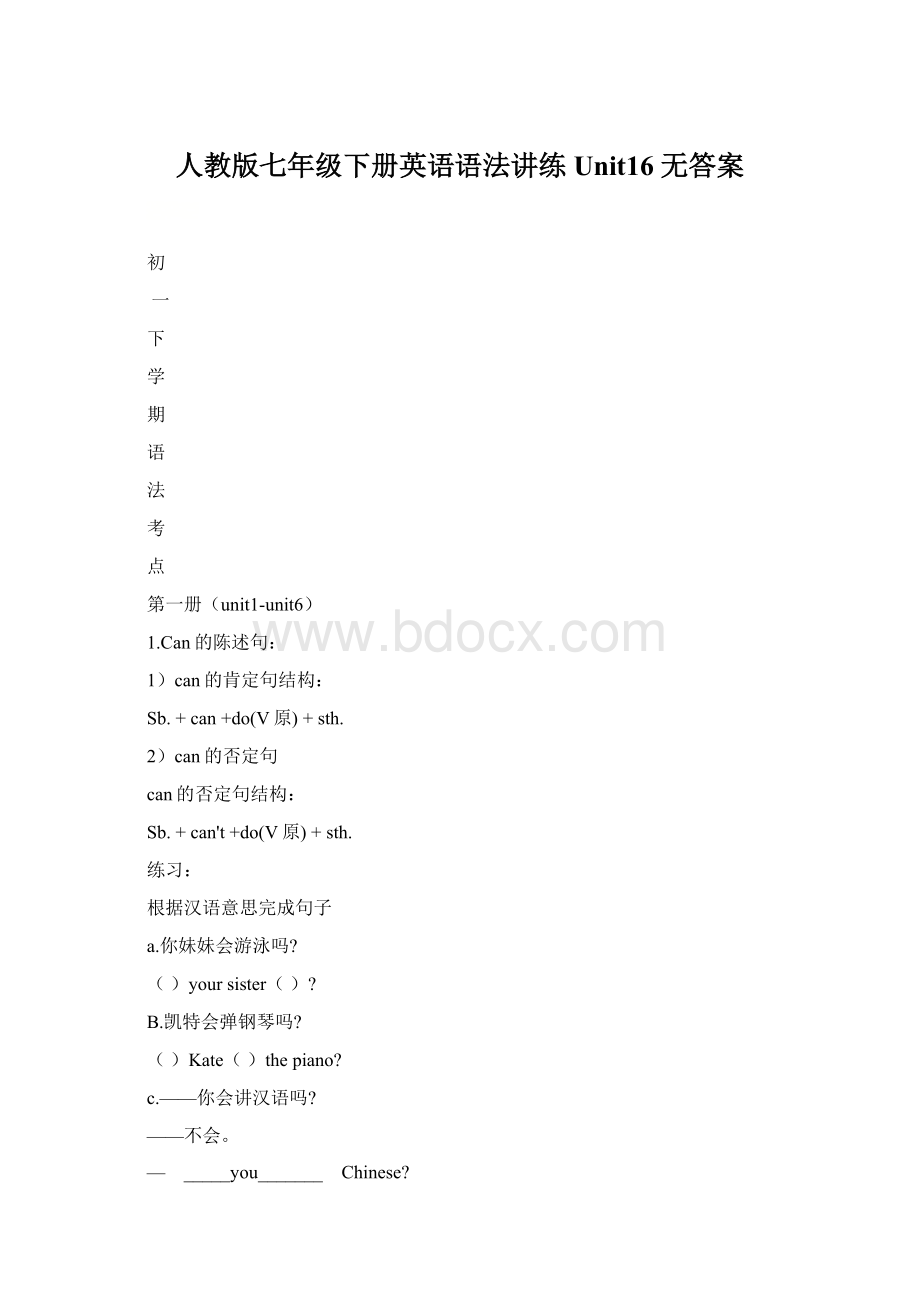 人教版七年级下册英语语法讲练 Unit16 无答案Word文档格式.docx
人教版七年级下册英语语法讲练 Unit16 无答案Word文档格式.docx
- 文档编号:21831250
- 上传时间:2023-02-01
- 格式:DOCX
- 页数:20
- 大小:611.02KB
人教版七年级下册英语语法讲练 Unit16 无答案Word文档格式.docx
《人教版七年级下册英语语法讲练 Unit16 无答案Word文档格式.docx》由会员分享,可在线阅读,更多相关《人教版七年级下册英语语法讲练 Unit16 无答案Word文档格式.docx(20页珍藏版)》请在冰豆网上搜索。

2)What的特殊疑问句
(二):
Whatclubdo/doessb.wanttojoin?
doI/we/you/they/第三人称复数
doeshe/she/it/第三人称单数
对划线部分进行提问。
a.WewanttojointheEnglishclub.
————————————————————
b.HecansinganEnglishsong.
c.Myfatherwantstojointheartclub.
句型转换。
a.Icandance.(变一般疑问句)
b.Canheplaytheguitarwell?
(做出否定回答)
c.Shecanpaint.(变否定句)
________________________________________
d.Hecanswim.(变一般疑问句并作肯定回答)
1.-Whattime+助动词(do/does)+主语+谓语动词+其他?
-主语(代词)+谓语动词+具体时间钟点
2.-特殊疑问词/词组(Whattime/when…等)+助动词(do/does)+主语+谓语动词+其他?
-主语(代词)+谓语动词+具体时间/年/月、日期非钟点性时间
3.When/Whattime区别:
表什么时候,具体时间(钟点)两者都可用。
年份,月份,日期等非钟点性时间只能用when不能用whattime
4.注意第三人称单数动词的变化
否定句:
Shedoesn’tgetupateighttwenty.
一般疑问句:
Doesshegetupateighttwenty?
特殊疑问句:
Whattimedoesshegetup?
Whendoesshegetup?
a.——()doyougetup?
---Igetupat6:
20.
b._______doeshegotoShanghai?
-HegoestoShanghaiinApril.
c._______doyouhaveswimminglesson?
–OnSundayafternoon
5.频度副词
频度副词表示“多久一次”,是一种表示频繁程度的副词。
常见频度副词按频率大小排列如下:
总是always99%
通常usually
常常often
有时sometimes
从未never0%
6.观察频度副词所放置的位置
频度副词通常位于实义动词之前,be动词、助动词、情态动词之后
a.I_______(通常)getdressedatsixforty.
b.Jackis_______(总是)late.
c.Hisgrandpa_______(从未)goestoschool.
d.He_____(经常)eatslunchat12:
00.
1.how
提问某人用某种交通工具
Howdo/does+sbget/goto某地
how是疑问副词,本句中用来提问出行方式等
对划线部分提问
a.Hegoestoworkonfoot.()
____________________________.
b.Ioftenridemybiketoschool.
______________________________
c.Theyusuallytakethebustoschool.
_______________________________.
2.提问时间的长短
Howlong+doesit+take(sb)todosth
回答:
Ittakes(sb)….todosth
a.你到这儿用了多长时间?
___________doesittakeyoutogethere?
b.Itakeanhourtogettoherhome.(划线部分提问)
__________________________________________
c.3.IttakesJane30minutestodoherhomework.(划线部分提问)
3.提问两地之间的距离
Howfar+isit+from….to…..
It’s(about)…(from….to…)
a.他家离上班地点有多远?
____________isitfromhishometohisworkplace?
b.从北京到上海有多远?
_______is__fromBeijing___Shanghai?
c.Lindalivestenkilometersfromschool.(划线部分提问)
____________________________________________
1.Must
Youmustbeontime.你一定要准时。
(1)must+Vmodalverb必须
1)must为情态动词,意为“必须,一定”。
情态动词不能单独作谓语动词,必须和动词原形一起构成谓语。
eg:
YoumustreadabookbeforeyouwatchTV.
在看电视前你必须读书。
2)must用于否定句时,mustn'
t意为“不允许,禁止”,而不表示“不必”。
Youmustn'
tbelateforschool.
你千万不要上学迟到。
3)以must开头的一般疑问句,若作否定回答,
可以用needn'
t或don'
thaveto,不用mustn'
t。
—MustIcleanalltherooms?
我必须打扫所有的房间吗?
—No,youneedn’t/don’thaveto.不,你不必。
2.haveto
1)haveto强调外界客观因素要求主语“不得不做某事”,表示客观上的需要,强调被迫性,有人称和时态的变化,其后接动词原形。
haveto有人称、数和时态的变化,其第三人称单数形式为hasto。
Wehavetoworkhard.
我们不得不努力工作。
2)含有haveto,hasto的句子变疑问句或否定句需分别借助助动词do,does。
否定形式是:
主语+don’t+haveto+动词原形+其他.(一般现在时,当主语是第三人称单数时,用doesn’thaveto,—般过去式用didn’thaveto)
Youdon'
thavetotellhimaboutit.
你没有必要把这件事告诉他。
3.辨析haveto与must
1.——Mum,mayIwatchTVnow?
——No,you___________finishyourhomeworkfirst.
A.mustn’t
B.must
C.haveto
D.can’t
2.——MustIfinishthatworktoday?
——No,you________.Youmayfinishitinthreedays.
A.shouldn’t
B.needn’t
C.mustn’t
D.hadn’tto
3.Yesterdayitrainedheavilywhenschoolwasover.
We_________stayinourclassroom.
A.must
B.should
C.hadto
D.need
4.——Ican’tstopplayingcomputergames.
——Foryourhealth,I’mafraidyou_________.
A.can
B.may
C.must
D.haveto
5.——Whatdidtheheadteachersayatthemeeting?
—Hesaid,“We________beproudofworkinghard.Wemustn’tbelazy.”
A.must
B.needn’t
C.may
D.can’t
4.can“能够;
可以;
会”
肯定句:
主语+can+动词原形+其他.
主语+cannot+动词原形+其他.
Can+主语+动词原词+其他?
肯定回答:
Yes,主语can./No,主语can’t.
5.祈使句
祈使句表示命令、请求、建议或劝告的句子。
肯定:
1)动词原形+其他
Standup,please.请起立。
2)Be+adj.
Becareful!
小心!
3)Letsb.+动词原形
Let'
sgotoschooltogether.咱们一起上学去吧。
否定:
1)Don'
t+动词原形
Don'
tstandup.别站起来。
2)Letsb.+not+动词原形
Letthemnotplaywithfire.别让他们玩火。
3)No+名词/doing
Nofishing.禁止垂钓。
6.祈使句口诀
祈使句,无主语,
动词原形在句首。
否定式,加don’t,
放在句子最前头。
表命令,提要求,
Please前后都可以。
Unit5Whydoyoulikepandas?
1.形容词的用法:
1).形容词是表示人或者事物属性或特征的词,一般修饰名词或者代词,在句中作定语或表语。
eg.Thisisabeautifulflower.(定语)
2)形容词作表语,位于系动词(be,look,sound等)之后,说明主语的情况。
eg.Theapplestasteverysweet.(表语)
a.树袋熊既可爱又美丽
Koalasareveryand.
b.大象很聪明,它们有点意思。
Theelephantsare,andtheyare
kindof.
c.熊猫和长颈鹿都是美丽的动物。
Pandasandare.
2.句型结构总结
1)Why+do/does+主语+动词原形+其他?
2)Why+don'
t/doesn'
t+主语+动词原形+其他?
3.1)询问原因时用“__why____”,回答原因时用“___because_______”。
询问地点时用“_where______”。
2)be(am/is/are)from译为__来自于_,与___comefrom__同义。
3)在答语中,我们使用了kindof,___very____和____really___来修饰形容词,它们的程度是依次___增强____(增强/减弱)。
1.现在进行时
a.Bob正在家里看书。
_____________________________________
b.JillandKate正在讲电话
______________________________________
2.动词变现在进行时
3.特殊疑问句?
a.Bob正在家里做什么。
_______________________________________
b.JillandKate正在做什么
4.be动词的句子变否定句和一般疑问句
a.I'
mreadinganewspaper
否:
一疑:
B.Sheisusingthecomputer.
C.Theyareshoppingatthesupermarket.
5.现在进行时的用法
现在进行时表示现在(说话瞬间)正在进行或发生的动作,也可以表示当前一段时间内的活动或现阶段正在进行的动作。
1)如何判断是否用现在进行时?
Eg.SheiswatchingTVnow/atthemoment.
※句中有时间状语now、atthemoment
Eg.Look,theyareplayingbasketballinthegym.
Listen,heissinging。
※句中有look、listen等提醒某人注意的词时;
Eg.Bequiet,sheisreadingabook.
It’s7:
00,theyareeatingdinner.
※句中有bequiet或It’s+钟点等词时;
用所给单词的适当形式填空
a.Look,TheSmiths(eat)dinnerathome.
b.Kate(play)thedrumsnow.
c.Listen,she(sing)inthemusicroom.
d.It'
s6:
00.MrsGreen(make)breakfast.
e.Bequiet,thebabies(sleep).
f.Jenny(do)hishomworkandlisteningtotheradio.
6.现在进行时和一般现在时的比较
单项选择
从A、B、C、D四个选项中选出可以填入空白处的最佳选项,并将其标号填入题前括号内。
()21.Manyofthestudentsnever__________/li:
v/thevillage.
A.learnB.leaveC.leafD.live
()22.—Youcantake__________subwaytothemuseum.
—No,I’llgothereby__________bike.
A./;
theB.the;
/C.the;
theD.a;
a
()23.—Isthisyourbook?
—No,itisn’t.Itis__________.
A.mineB.yourC.hersD.her
()24.—Istherea__________nearhere?
—Look!
Thereisonenexttotheschool,youcaneatandlivethere.
A.bankB.hotelC.cinema.D.postoffice
()25.—Whendoyouusuallyhavebreakfastinthemorning?
—__________eighto’clock.
A.AtB.OnC.InD.For
()26.—Howmanybikescanyouseeinthemuseum?
—Aboutthree__________.
A.hundredB.hundredsC.hundredofD.hundredsof
()27.—How'
stheweatherthere?
—It’s__________.
A.sunnyB.rainyC.snowyD.foggy
()28.—Whydoyoulikepandas?
—__________theyareverycute.
A.SoB.OrC.AndD.Because
()29.—WhereareTonyandJimmy?
They__________footballoverthere.
A.playB.playingC.isplayingD.areplaying
()30.—__________isitfromyourschooltoyourhome?
一Aboutsixkilometers.
A.HowfarB.HowlongC.HowmuchD.Howmany
()31.—Whatdoyouusuallydoonrainydays?
—Ienjoy__________athome.
A.readB.readsC.readingD.toread
()32.—Don’tbelateforclass.Thisisveryimportant.
—OK!
We__________beontime.
A.canB.mayC.mustD.could
()33.—What’sonthetable?
—There__________somemilk,twoeggsandafewcakesonthetable.
A.isB.areC.hasD.have
()34.—Excuseme,I__________here,canyoutellmethewaytothepolicestation?
—Don’tworry,followme.
A.getwellB.getlostC.getdressedD.getpopular
()35.—Wow!
Youplaytheviolinverywell,Bob.—__________.
A.Thankyou.B.Youaresosmart.
C.Notmuch.D.Thatsoundsgood.
完形填空
先通读短文,掌握其大意,然后从A、B、C、D四个选项中选出一个可以填入空白处的最佳答案,并将其标号填入题前括号内。
LiuPingis13yearsold.HeisastudentofNo.1MiddleSchool.HehasagoodfriendnamedMartin.Martinisan36boy.HeliveswithhisparentsinChinanow.Heis13yearsold,37.Martinisnow38inthesameschoolasLiuPing.Andtheydon’tliveveryfarfromeachother.Everyday,theymeetatthebusstop.Thentheytakethe39toschooltogether.Itisnotveryfarfromtheirhometoschool.Itonly40them10minutestogettoschool.Atschool,MartinstudiesChineseeveryday.Hecan41Chineseverywell.Heoftenhelpsotherstudents42theirEnglish.Martinlikesplayingsports.Healsolikes43verymuch.Sohehasalotoffriendsatschool.Hepractices44basketballafterschooleveryday.IfyouwanttomakefriendswithMartin,youcaneithercallLiuPingat411805345gotoClass3,Grade7totellhim.HewillbehappytointroduceyoutoMartin.Hopeyoucanbegoodfriendsinthefuture.
()36.A.AustraliaB.AustralianC.Australia’sD.Australian’s
()37.A.tooB.alsoC.eitherD.neither
()38.A.studyB.studiesC.studiedD.studying
()39.A.carB.busC.trainD.subway
()40.A.paysB.costsC.takesD.spends
()41.A.sayB.tellC.ta
- 配套讲稿:
如PPT文件的首页显示word图标,表示该PPT已包含配套word讲稿。双击word图标可打开word文档。
- 特殊限制:
部分文档作品中含有的国旗、国徽等图片,仅作为作品整体效果示例展示,禁止商用。设计者仅对作品中独创性部分享有著作权。
- 关 键 词:
- 人教版七年级下册英语语法讲练 Unit16 无答案 人教版七 年级 下册 英语语法 答案
 冰豆网所有资源均是用户自行上传分享,仅供网友学习交流,未经上传用户书面授权,请勿作他用。
冰豆网所有资源均是用户自行上传分享,仅供网友学习交流,未经上传用户书面授权,请勿作他用。


 对中国城市家庭的教育投资行为的理论和实证研究.docx
对中国城市家庭的教育投资行为的理论和实证研究.docx
